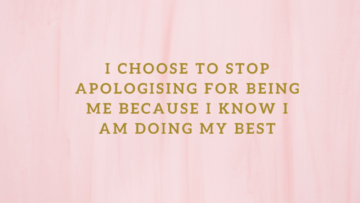
Understanding the Basics of Self-Care
My interest in self-care in recent years has had me on a mission to uncover what this phenomenon entails and discovering the 7 Pillars of Self-Care has been necessary for my understanding of how to genuinely take care of ourselves.
Until I really understood what self-care entailed, I often came across people who viewed ‘self-care as a codeword or perhaps as an excuse for a day off or a shopping spree. But in my experience, it’s far more fundamental. Self-care represents an array of practices aimed at enhancing our well-being across multiple dimensions of life.
Why Self-Care Matters
Why does self-care demand our attention? Simply put, it’s the basis for a thriving life and the art of self-care should be done intentionally – I call this active self-care. When we diligently, care for ourselves we nurture and improve our physical, mental, and emotional well-being. This, in turn, amplifies our capacity to engage with the world around us.
Self-Care is an Active Choice
Active self-care is about adopting practices that foster resilience in the face of life’s stressors. That’s where understanding the seven pillars of self-care can be transformative. These steps are proactive steps towards a well-rounded, healthy life.
As I explore this topic, and more in-depth in subsequent articles, I’ll briefly touch on the importance of each pillar and provide insights on valuable frameworks and studies underscoring the vital components of self-care.
With this foundation, it’s essential to recognize that optimizing our well-being begins with the basics – the BODY. So, let’s start with Physical Wellness. In this section, we’ll examine some tactics for not just to survive, but to THRIVE physically.

Physical Wellness
You Are What You Eat, Move, and Believe
The foundation of good health starts with a focus on physical wellness. This pillar is about caring for your body to keep it functioning at its best. There are so many external factors that go into keeping our bodies functioning optimally. There are some obvious ones like exercising and good nutrition but let’s not forget our physical appearance and taking time to rest.
Make Every Movement Count
It’s a fact that consistent exercise is key here, though this is not about intense workouts necessarily, but a regular physical activity that you can enjoy and maintain. The idea is to keep your body in motion because as research suggests, even moderate exercise can have substantial health benefits.
A good 30-minute steady cardio at your zone 2 – if you have a smartwatch this can show you where your zone 2 is. But if you don’t have a smartwatch to track just concentrate on moving at least 30 minutes a day.
I make sure I walk 10,000 steps a day and this can be through taking the stairs instead of the elevator where possible or ditching the bus and walking to shops. There are so many ways to get the body moving and you know best what you enjoy.
Nourishing Your Movement
Next, think about what you eat because we truly become what we eat. Nutrition plays a significant role in self-care. Fueling our body with the right foods can boost our energy levels, mood, and overall health. It isn’t just about dieting or cutting things out; it’s about balance and getting a variety of nutrients from our meals.
Remember, eating should be a joy, not a chore. I love colours so I try my best to make sure my plate is filled with at least 4 different colours of vegetables just so I know I am getting a variety of nutrients at a sitting. When it comes to food, the closer to nature the better as my partner constantly reminds me of.
If possible my suggestion is to incorporate more natural and whole foods to your meals. I encourage you to try the colourful plate as this helps you also get a mix of nutrients in your diet. Not only is it beautiful to look at but it is also a fun way to introduce different food sources into your diet, especially for your kids if you have any.
Maintaining Your Best Physical Self
Now, let’s see how taking care of our physical appearance plays a role in our physical well-being. It really is true that your attitude is also deeply influenced by how you look on the outside. This became very apparent to me during the COVID lockdown when we were so happy to just work from home in our jogging bottoms and the like.
I soon realised that this had a huge effect on my efficiency and attitude towards work. I felt sluggish and unmotivated but then I switched my routine and started dressing up to start my day as I would if I were to be going into the office and boy, did that change my mood and attitude.
I learnt that in order to feel my utmost I needed to also take care of how I showed up to the external world. It had nothing to do with going overboard with dressing but the mere fact of being well put together was what mattered.

Prioritizing Rest for Better Well-Being
And let’s not forget about rest. Our bodies need time to repair itself, and that’s where quality sleep comes in. The consensus among research is that healthy sleep habits are essential to physical wellness.
Adults typically need 7-9 hours of sleep per night, but it’s not only about quantity—it’s quality that counts. A regular sleep schedule and a restful environment are paramount. It’s advised that before we actually turn in to sleep we set away a 15-13 minute winddown window to help us settle down before falling asleep.
A Simple Routine is All You Need
My sleep routine looks like this – 30 minutes before bed time my phone goes into sleep mode, I spend 10-15 minutes getting ready for bed and then for the next 15 minutes I do my gratitude journaling with a physical journal and pen and and slowly lay down till I fall asleep.
Embracing physical wellness sets the stage for improved well-being in other aspects of life. It’s about finding what works for you and making small, sustainable changes. Whether it’s choosing stairs over an elevator, preparing a homemade meal, or establishing a bedtime routine, your body will thank you for it.
Mental and Emotional Well-being
Self-Care for Emotional and Mental Health
Mental well-being and emotional intelligence are deeply intertwined aspects of self-care, essential for leading a balanced and fulfilling life. There are countless ways to take care of our mental health and for me, setting aside time to indulge in my devotion, practising mindfulness and regularly journaling my thoughts have significantly improved my mental well-being, allowing me to process emotions and stress more effectively.
Research supports the connection between emotional intelligence and mental health, showing that individuals who are more adept at recognizing and managing their emotions tend to experience lower levels of anxiety and depression and higher overall life satisfaction.

Cultivating a Healthier Mind and Heart
Not only does mastering our emotions play a pivotal role in self-care, it also helps us to identify and manage both our feelings and those of others. Being emotionally intelligent makes us perceptive of others and helps us make sound decisions, manage stress effectively, and maintain a positive mindset.
Developing a good handle on our emotions isn’t just about doing things that make us feel better but rather about creating conditions internally and externally, against the stresses that life inevitably throws our way. One vital aspect of being emotionally intelligent is having self-awareness.
Enhancing Self-Care Through Self-Awareness
Self-awareness is our conscious knowledge of our own character, feelings, motives, and desires. This awareness involves recognizing our strengths and weaknesses, understanding our emotions and how they influence our behaviour, and being mindful of how we interact with others and the environment around us.
By recognizing our emotional triggers and understanding how they affect us, we’re better equipped to navigate complex emotional situations.
It is worth noting that emotional intelligence involves more than just introspection. It’s also about outward actions like communication and empathy. Strengthening these skills can lead to improved relationships and a more supportive network, which further boosts our emotional well-being.
Indulging in Mindfulness for Effective Self-Care
Practices like mindfulness, meditation, or journaling are invaluable tools in this endeavour, they encourage us to slow down and reflect, in turn offering clarity and calming the mind. It’s about taking time to tune into our feelings and how we respond and not just react to external influences throughout our waking hours.
Equally, being emotionally intelligent is about openness to personal growth and learning; and acknowledging and naming our emotions is a healthy way of working through and managing situations.
Social Self-Care for Better Well-Being
The Power of Community
Social self-care is about nurturing your relationships and creating a supportive social network. It is closely linked with our mental well-being and emotional intelligence because being social creatures we thrive emotionally when our social network is working harmoniously.
Prioritizing Relationships in Self-Care
Personally, I prioritize regular meet-ups with friends and family, as these interactions greatly affect my mood and provide a sense of belonging. Research highlights the importance of social connections, showing that strong social networks can enhance mental health, reduce stress, and even extend lifespan.
This fact is one of the vital aspects of the population within the “Blue Zones”. Areas in different parts of the world, where most people live up to 100 years old. Social self-care, though not mostly touched upon is an aspect of self-care that can’t be downplayed, for as the saying goes “no man is an island” and we need others to have and live a fulfilling life
Integrating Spirituality into Self-Care
Connecting to Something Bigger for Peace Through Self-Care
For the longest time spirituality has been an essential aspect of my life even when I faltered and lost my connection, I’ve always found a way back to connecting with God/Source.

Spiritual self-care is one of the most underrated forms of self-care but this is actually an aspect that we can’t do without. It involves nurturing our inner life through practices that bring a sense of peace, purpose, and connection to something greater than ourselves.
Embracing Spirituality for a Balanced Life
I personally, find solace in my daily devotion, meditation and moments of reflection, which allow me to reconnect with my core values and beliefs. There are several researches supporting the benefits of such practices, showing that regular engagement in spiritual activities can reduce stress, enhance emotional well-being, and improve overall mental health.
For many, including myself, activities like prayer, mindfulness, or spending time in nature can provide a profound sense of grounding and fulfillment, whilst promoting resilience and a deeper understanding of our place in the world.
Professional Self-Care for Thriving at Work
Balancing Career and Well-Being
You will definitely be familiar with the phrase – Work/Life balance and how important it is to have this in our professional lives. Professional self-care involves actively managing your career and work-life balance to prevent burnout and maintain job satisfaction.
One thing that has worked really well for me in finding this balance is, setting clear boundaries between work and personal time. I make a point to disconnect from work emails after hours and dedicate time to family and hobbies that rejuvenate me. It can be hard to find this balance but once again remember it’s an active choice to do this.
Make the Time Count
When I turn off my laptop after a working day or during the weekend, it stays off till the next working day and the same goes for when I am on vacation. Time is the most essential and finite asset we have and we spend a lot of it at work so that we can enjoy the luxuries of life. But it’s worth noting that this same time is precious and we need to spend as much as possible with our loved ones and doing what brings us joy.
It’s been known that professionals who maintain a healthy work-life balance experience lower stress levels and higher job satisfaction. There is also the aspect of continuous development to get us to the places we want in our careers.
Engaging in continuous learning and professional development has also been essential for me, as it keeps me motivated and helps me stay current in my field. Ultimately these have led to greater career fulfillment and productivity in my professional life so far.
Recreational Self-Care
Have Fun to Revive Your Soul
It’s a shame how many people forget to play because they are now adults. Society doesn’t make it easier either but finding and making time to indulge in a favourite pastime is something that does not only bring joy but keeps our creativity alive. Recreational self-care involves engaging in activities that bring joy and relaxation, helping to recharge and rejuvenate your spirit.
For me, setting aside time each week for hobbies like baking, hiking, and writing is essential. These activities not only provide a break from routine stress but also stimulate creativity and improve my overall well-being.
The Benefits of Leisure Pursuits
Numerous researches support the benefits of recreational activities, showing that leisure pursuits can reduce stress, enhance mood, and improve cognitive function. Indulging in a recreational activity might look different for everyone so I won’t give any lists but I’d strongly encourage you to find and make time for these.
By prioritizing recreational self-care, I find myself more balanced and energized, and more creative in handling the challenges of everyday life.

Environmental Harmony
Eliminating the Unnecessary So the Necessary Can Speak
We often underestimate the impact our surroundings have on our well-being. Yet, the environments where we spend our time, whether at home, work or in outdoor spaces, significantly influence our health and productivity.
Achieving environmental harmony is about ensuring our physical spaces support our health and self-care routines.
A Simplified Uncluttered Home is a Form of Self-Care
It might sound cliché but I find that an organized, clutter-free environment reduces stress and improves my focus. Where you are right now is shaping your mood and thoughts, perhaps more than you might be aware.
A tidy room, a serene workspace, and access to natural surroundings can very much improve relaxation and clarity of mind.
Remove Things That Distract You; Make Room for the Things You Love
Practical steps towards this aspect of self-care involve regular decluttering and organizing our personal and professional spaces to create an atmosphere conducive to relaxation and efficiency. It’s about making intentional choices to surround ourselves with items that serve a purpose, either functional or inspirational.
Why Nature Sheds Leaves and Regrows New Ones Every Year
In terms of connecting with nature, which is frequently mentioned as a source of great emotional comfort and rejuvenation, I’d encourage trying to integrate green spaces into your life. Even small changes like adding plants to your room, taking walks in the park, or ensuring your workspace has natural light can create a positive shift in your daily experience.
Outer Order Contributes to Inner Calm
The sustainable aspect of environmental harmony also reminds us of our larger responsibility to the natural world. By making environmentally friendly choices in our daily lives, such as reducing waste, recycling, or using eco-friendly products, we not only take care of ourselves but also contribute to the health of our planet.
As a final thought on this pillar, remember that environmental harmony doesn’t necessarily require grand gestures. It’s the small, consistent actions that build a supportive and restorative environment, which, in turn, nurtures our well-being.
The 7 Pillars In A Nut Shell
We’ve explored the seven pillars that hold up the structure of comprehensive self-care. They each stand independent, yet interconnected to support our overall well-being.
These practices will look different for many of us yet the basic fundamentals to remember is to make sure we include each pillar in our holistic self-care approach.
Here’s a straightforward strategy to begin integrating these practices: Start small. Integrate one new habit from any pillar each week. This could be a short walk, a new vegetable in your diet, or reaching out to a friend.
Lastly, know that Your commitment to self-care is unique and will look different even from your twin’s. Learning to take care of ourselves is a gradual process with many nuances and the most important thing to remember is you actively make this a part of your daily life, however small the act.
Hope you enjoyed this article, if you have any questions or experiences you would like to share kindly do so in the comments. If you would also like to receive weekly tips do join our community by subscribing to our email list.
Love & Light
Sheila Daisy




